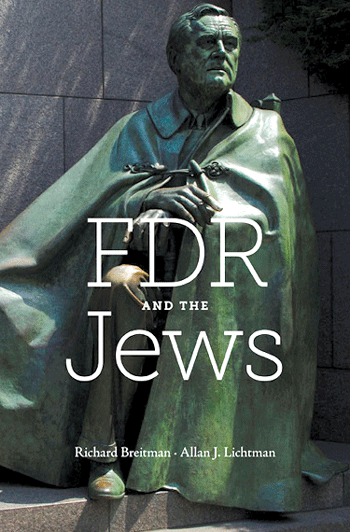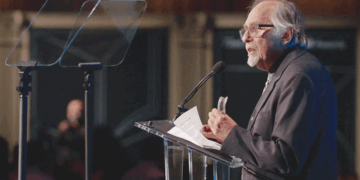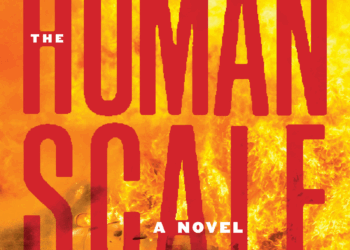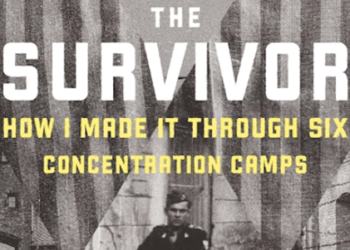FDR and the Jews, by Richard Breitman and Allan J. Lichtman, Belknap Press (Harvard), 433 pages, $29.95
Reviewed by NEAL GENDLER
Did President Franklin D. Roosevelt do enough to rescue Europe’s Jews?
The easy answer is “no,” but better questions are whether he did all he could have done, or wished to do, or thought possible in the anti-immigrant, isolationist and anti-Semitic America of the 1930s and 1940s.
Those questions have been debated for decades by American Jews — once among FDR’s most ardent supporters — and they’re the questions Richard Breitman and Allan J. Lichtman, American University distinguished history professors, try to answer in their superb FDR and the Jews.
“Our work challenges both extremes in this dispute,” the authors say. “He did more for Jews than any other world figure, even if his efforts seem deficient in retrospect.”
The authors say FDR went through four phases on Jewish issues, becoming increasingly sympathetic — and also supportive of a Jewish homeland. But repudiating President Hoover’s Depression-related policies did not include ending a 90-percent cut in the very restrictive 1924 quotas that ended massive Jewish immigration.
FDR did act to help Jews, although his refugee-resettlement efforts were to encourage other nations, especially in Latin America, to take them. He repeatedly urged Britain to admit more Jews to its Palestine Mandate, publicly declaring: “Jews have a right to resettle the land where their faith was born.” Britain repeatedly refused.

The authors make abundantly clear that Americans’ antipathy to Jews strongly affected, even limited, FDR’s actions. He was perceived widely as too surrounded and influenced by Jews, and during the war, efforts were made to avoid the appearance of fighting for Jews — including suppressing news of Nazi atrocities.
Even knowing Jew-hatred’s social acceptability then leaves room for shock at what educated people said openly. At a dinner party, Republican William R. Castle Jr., former undersecretary of state, told a sponsor of a bill to let in 20,000 refugee children: “I should prefer to let in 20,000 old Jews who would not multiply.” FDR did not push for the bill, and it failed.
The chief U.S. villain is Assistant Secretary of State Breckenridge Long, who epitomized his anti-Semitic department and worked to deny Jews entry. The authors call him “ambitious, anti-immigrant and underhanded.” On June 26, 1940, he wrote that the State Department could advise “counsels to put every obstacle in the way [of refugees]… which would postpone and postpone and postpone.”
The chief hero is Treasury Secretary Henry Morgenthau Jr., the Cabinet’s sole Jew, who pressed FDR to help Europe’s Jews and whose department took on the State Department late in 1943, eventually discrediting and neutralizing Long. Next is Rabbi Stephen Wise, who used his access to FDR to urge rescuing Jews.
Although the more strident Rabbi Abba Hillel Silver denounced Wise as a “Court Jew,” Wise organized large rallies and strongly advocated protest, denunciation, agitation and boycott of German products.
But America’s Jews lacked power and further weakened themselves by contradictory infighting.
“To some observers, it appeared that Jewish leaders hated each other almost as much as they hated Hitler,” the authors say.
Roosevelt the politician did not let his sympathies extend to risking his political goals. For example, admitting the Jews aboard the St. Louis in 1939 would have exceeded quotas and consumed political capital needed to aid Britain.
“Decades afterward, the non-bombing of Auschwitz has become a symbol of Roosevelt’s alleged failure,” but the authors say the War Department killed such proposals before they reached him. “Even if FDR had been more willing to override domestic opposition and twist arms abroad, he could not have stopped the Nazis’ mass murder.”
Breitman and Lichtman neither condemn nor exonerate Roosevelt. They say: “For most of his presidency, Roosevelt did little to aid the imperiled Jews of Germany and Europe… Still, at times, Roosevelt acted decisively to rescue Jews, often withstanding contrary pressures from the American public, Congress and his own State Department.”
FDR and the Jews authoritatively answers myriad questions, but I doubt the debate will end.
***
Neal Gendler is a Minneapolis writer and editor.
(American Jewish World, 7.5.13)



















